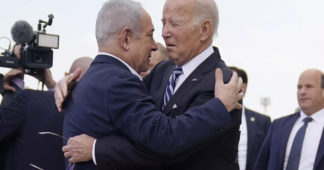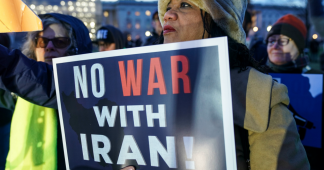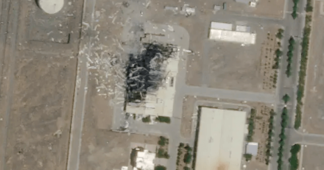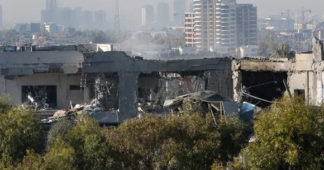By Barak Ravid
Apr 15, 2024
Israeli Minister of Defense Yoav Gallant told Defense Secretary Lloyd Austin Sunday that Israel has no choice but to respond to the unprecedented missile and drone attack launched by Iran over the weekend, a U.S. official and another source briefed on the call told Axios.
Why it matters: The Biden administration and several other Western countries allied with Israel are urging Benjamin Netanyahu’s government not to rush into a retaliation against Iran that could lead to a regional war.
The latest: Gen. Herzi Halevi, chief of staff of the Israel Defense Forces, said Monday that “Israel is considering next steps” and that “the launch of so many missiles and drones to Israeli territory will be answered with a retaliation.”
- Ahead of a meeting Monday with Iraq’s deputy prime minister, Secretary of State Antony Blinken said the U.S. is coordinating a diplomatic response to the Iranian attack intended to prevent further escalation.
- “Strength and wisdom must be the two sides of the same coin,” Blinken said in what appeared to be a message for Israel.
President Biden said during a meeting with Iraq’s prime minister: “We’re committed to a ceasefire that will bring the hostages home and prevent the conflict from spreading beyond what it already has. The United States is committed to Israel’s security.”
- “[Biden] is certainly not looking for a war with Iran and I am confident that Prime Minister Netanyahu is aware of the president’s concerns,” White House spokesman John Kirby told reporters.
The other side: Iran’s Foreign Minister Hossein Amir-Abdollahian told U.K. Foreign Secretary David Cameron in a phone call Monday that Iran does not want escalation — but that if Israel “seeks adventure, our next response will be immediate, stronger and more extensive,” Iran’s Foreign Ministry said in a statement.
State of play: The Israeli war cabinet convened on Monday to discuss its potential response.
- Iran launched nearly 350 attack drones and missiles against Israel on April 13 in retaliation for an April 1 Israeli airstrike on its embassy compound in Syria that killed a top Iranian general and others.
- Most of the drones and missiles were intercepted outside of Israeli airspace by Israeli, U.S., British, French, Jordanian and Saudi forces, officials said.
Behind the scenes: Gallant told Austin in a phone call Sunday that Israel can’t allow ballistic missiles to be launched against its territory without a response, the U.S. official and the source briefed on the call said.
- Israel won’t accept an equation in which Iran responds with a direct attack every time Israel strikes targets in Syria, Gallant added.
- The sources said Austin conveyed a similar message to the one President Biden gave Netanyahu on Saturday night, stressing the need to do everything possible to avoid further escalation.
- “You got a win. Take the win,” Biden told Netanyahu, warning that the U.S. won’t support any Israeli counterattack against Iran.
What they’re saying: The Israeli Ministry of Defense and the Pentagon declined to comment.
- The public Israeli readout of the call said Gallant expressed “deep appreciation” to Austin for the cooperation and coordination between the IDF, the U.S. military and other international partners to counter the Iranian attack.
- “Minister Gallant emphasized that Israel’s defense establishment remains alert and prepared to face additional threats,” the Israeli readout said.
- In the U.S. readout of the call. the Pentagon said Austin “emphasized that while the U.S. does not seek escalation, we will continue to take all necessary action to defend Israel and U.S. personnel.”
The big picture: The Pentagon and the Israeli Ministry of Defense said that Austin and Gallant also discussed efforts to establish an international and regional coalition against Iran.
- Austin briefed Gallant on his consultations with partners and allies “to reinforce international resolve in the face of Iranian aggression,” the Pentagon said.
- Gallant told Austin there is an opportunity to establish “a strategic alliance to counter the threat posed by Iran.”
We remind our readers that publication of articles on our site does not mean that we agree with what is written. Our policy is to publish anything which we consider of interest, so as to assist our readers in forming their opinions. Sometimes we even publish articles with which we totally disagree, since we believe it is important for our readers to be informed on as wide a spectrum of views as possible.











